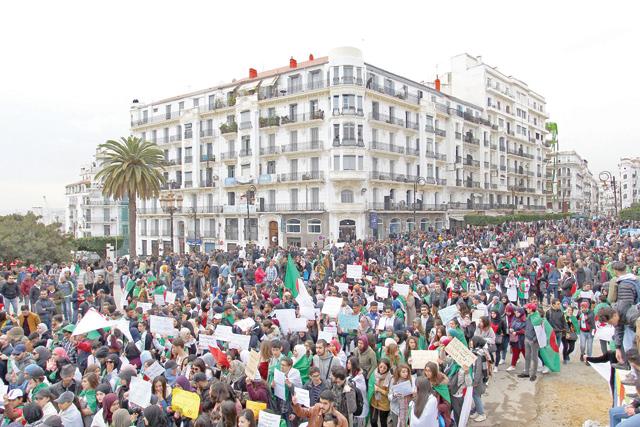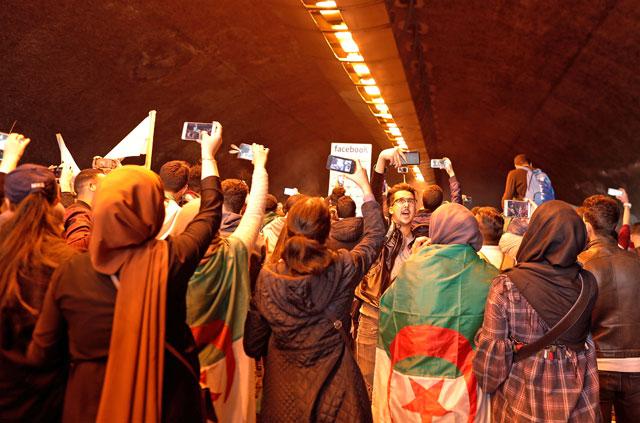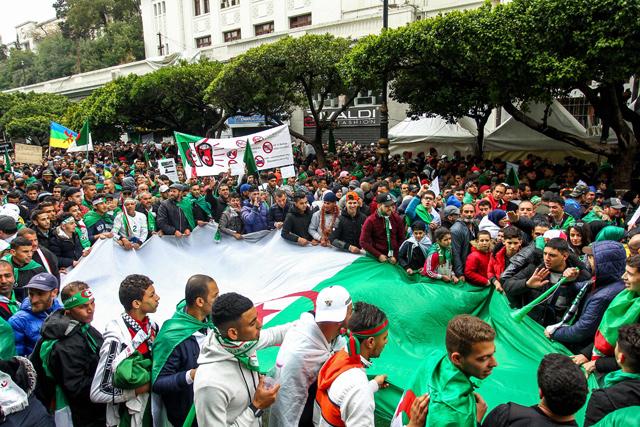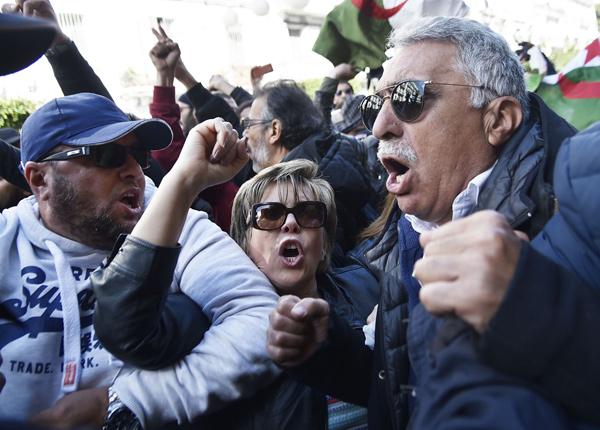You are here
Algerian army chief, ruling party support protesters
By Reuters - Mar 20,2019 - Last updated at Mar 20,2019

Algerians carry placards and national flags as they take part in a demonstration in the capital Algiers against President Abdelaziz Bouteflika on Tuesday (AFP photo)
ALGIERS — Algeria's army chief said the public had expressed "noble aims" during protests against President Abdelaziz Bouteflika and the ruling FLN Party withdrew its support for him, in the heaviest blows for the veteran leader since the unrest began.
Lieutenant General Ahmed Gaed Salah said that a month of demonstrations had been "marked by the deeds of noble aims and pure intentions, through which the Algerian people has clearly expressed its values and principles of sincere and dedicated work to Allah and the motherland".
The comments, made on Tuesday during a tour of a military district and carried by Algerian media on Wednesday, were the clearest signal yet that the army was distancing itself from the ailing Bouteflika, in power for 20 years.
The ruling National Liberation Front party, known by its French acronym FLN, also sided with the protesters after a meeting of its top officials.
"FLN fully supports the popular protest movement," the APS state news agency quoted FLN leader Moad Bouchared as saying.
The party also called for negotiations to ensure stability in Algeria, a major oil and gas producer.
"There is a need to work devoutly and advocate unified dialogue," Bouchared added, according to APS.
Bouteflika, 82, bowed to the protesters last week by reversing plans to stand for a fifth term. But he stopped short of stepping down and said he would stay in office until a new constitution is adopted, effectively extending his present term.
Tired of the old guard
His moves have done nothing to placate protesters pushing for a new generation to take over from Bouteflika and other veterans of the 1954-1962 independence war against France who have dominated the country.
Leaders who have emerged from the protest movement have not yet built up enough momentum to force him to quit or make more concessions. But the position of the army chief of staff and the FLN could make his position untenable.
The military, which wields enormous power from behind the scenes, has patiently watched the struggle from the sidelines, while making it clear that chaos would not be tolerated.
The president has rarely been seen in public since suffering a stroke five years ago, and the protesters say a shadowy circle of aides, including his powerful younger brother Said, have been ruling the country in his name.
Bouteflika had proven adept at consolidating his power.
In 2016, he dissolved the long-standing military spy directorate known as the DRS, creating a new agency under the control of the presidency in another step to ease the military out of politics, security sources said.
Last year, he dismissed a dozen military officers to concentrate power in his inner non-military circle.
But Bouteflika can no longer afford to antagonise the generals, who have previously intervened in politics at critical moments, including in the early 1990s.
The military then cancelled an election which an Islamist party had been poised to win, triggering almost a decade of civil war in which some 200,000 people were killed.
A possible role for Islamists in any future government is one of the issues that could divide the public and potentially provoke the military.
For years, rumours have swirled about potential successors for Bouteflika, but no one credible has emerged who has the backing of the army and elite and is not in their 70s or 80s.
Bouteflika has been falling back on a strategy which has worked with the opposition in the past — buying time to search for opportunities to divide and rule.
But that looks less likely to succeed now with so many allies withdrawing support. The Ennahar online news site, which is close to Bouteflika, has suggested that the president would step down once his current term ends on April 28.
Bouteflika survived the 2011 "Arab Spring" uprisings by using vast oil and natural gas resources to boost state spending, pacifying Algerians who had similar frustrations to those in neighbouring countries where autocrats were toppled.
Many Algerians accepted heavy-handed rule as the cost of stability after the conflict with the Islamist insurgents, which Bouteflika is credited with having brought to an end.
But a new generation which does not fear change is desperate for jobs, greater freedoms and a say in how the country is run.
Almost 70 per cent of Algerians are under 30 years old, and more than a quarter of the people below that age are unemployed.
Bouteflika sent Deputy Prime Minister Ramtane Lamamra on a tour of allied countries to seek support for efforts to defuse the crisis.
In Berlin, Lamamra said Bouteflika would hand over power to a democratically elected successor after a new constitution has been approved and a national conference on the way forward has been held.
Related Articles
ALGIERS — Thousands of students, university professors and health workers rallied in Algiers on Tuesday calling for President Abdelaziz Bout
ALGIERS — Hundreds of thousands of Algerians rallied on Friday to demand the immediate resignation of President Abdelaziz Bouteflika,
ALGIERS — Algerian police fired tear gas to disperse hundreds of demonstrators on a third straight day of rare political protests again



















